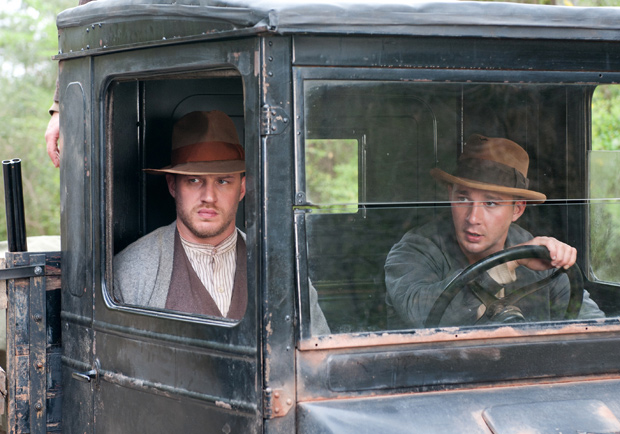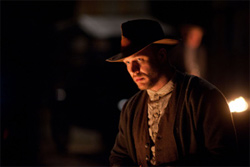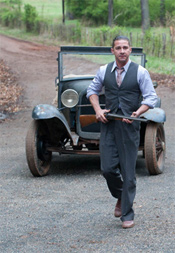Director John Hillcoat likes to make movies about the tenuous balance between humanity, order, and civilization on one hand, and savagery, chaos, and lawlessness on the other. His Australian western The Proposition (2005) explored this territory, as did his dark adaptation of Cormac McCarthy's The Road (2009). With Lawless, a violent, Prohibition-set bootlegging/crime drama, Hillcoat continues in this vein, attempting to understand the themes of survival and goodness in the midst of a world on the precipice.
Based on the 2008 book, The Wettest County in the World—by Matt Bondurant, grandson of one of the story's main characters—Hillcoat's film depicts the true 1920s-30s lives of the Bondurant brothers, a trio of infamous moonshiners and bootleggers in Franklin County, Virginia. Forrest (Tom Hardy), Howard (Jason Clarke), and Jack (Shia LaBeouf) run an impressive capitalistic venture, supplying high quality moonshine to the thriving local bootlegging industry at the height of Prohibition. They're making good money, steering clear of mob run-ins and fortifying their status as local legends. Everything is illegal and the world is lawless, but the Bondurant boys are living in relative peace.

Things change, however, when the "law" comes calling, in the form of Special Agent Charlie Rakes (Guy Pearce). Of course, this being an era of widespread institutionalized corruption, Rakes is the most lawless of all. He's a psychotic, bloodthirsty villain in a pinstriped suit and white gloves. He takes aim at the Bondurant operation and orchestrates a bloody, ruthless offensive to take the brothers down.
The plot of Lawless doesn't offer many surprises and the film feels pretty standard as Prohibition crime dramas go. If you've seen Road to Perdition, The Untouchables, or Public Enemies, nothing in Lawless will feel particularly groundbreaking. Nevertheless, the film succeeds on the basis of excellent performances, terrific action sequences, and a well-rendered sense of dread.
The film is wonderfully cast. Fresh off of his turn as Bane in The Dark Knight Rises, Hardy plays another sort of strongman in Lawless, and does so with compelling charisma (and a similarly quizzical voice). The character of Forrest is perfect for Hardy: a silent-but-deadly man's man who grunts more than he talks and wields brass knuckles viciously, but only when he needs to. As the sidekick little brother who would never hurt a fly (let alone use brass knuckles), LaBeouf delivers a charming, wide-eyed performance. Though sadly underutilized as the damsels-in-distress love interests to the Bondurant boys, Jessica Chastain and Mia Wasikowska make the most of their supporting roles. As Chicago criminal heavyweight Floyd Banner, Gary Oldman also shines in what amounts to an extended cameo. But the film's real star is Guy Pearce, whose turn as a slithering, hair-slicked-back villain is impressively menacing.
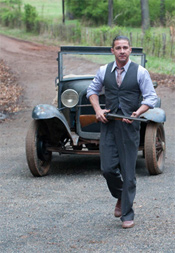
Pearce's "civilized" lawman with crazy eyes and bulging forehead vein is the perfect villain for a film set in a world teetering between structures/order and terrifying lawlessness. The Bondurants represent a family that wants mostly to be left to their peaceable (albeit very illegal) business, but sometimes can't escape being pulled into the inertia of morally dubious activity. The film's tension between moral structure and lawlessness is especially evident in the character of Jack, the "innocent" Bondurant—compared to his grittier, more worldly brothers—who nevertheless flirts with corruption. In one fascinating scene, Jack stumbles drunk into what appears to be an Amish church, where a foot-washing service is taking place. His girlfriend, the sweet Bertha (Wasikowska), washes his feet, but Jack can't take it. He breaks into sweats, vomits in the church, and runs out shoeless.
Perhaps because it vividly confronts him with a goodness that contrasts with his family's increasingly debased involvements, Jack doesn't return to the church. However, he still pursues Bertha—a good girl with one of those classic attractions to bad boys—and hopes to do right by her, even though his lifestyle inevitably puts her in harm's way.
The presence of the church and Bertha's religiously pious community raises the question: where is God in this out-of-control world? Is he relevant? It's a question Hillcoat's other films raise too: The Road's scene of father and son taking shelter from the harsh, apocalyptic world in a long-abandoned church building; The Proposition's scene of a family's Christmas dinner preempted by the intrusion of climactic, bloody violence.
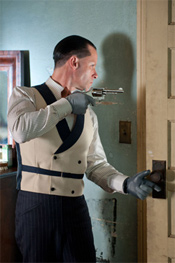
Lawless resides in similar space, pondering God's existence in a world that seems arbitrary and animalistic. For the Bondurants, the only thing that really makes sense is survival, and they are survivors. "It's not the violence that sets us apart," Forrest tells Jack. "We are survivors. We control the fear. Without the fear, we are all good as dead." Ultimately, though, even the ability to control one's fear can't guarantee survival. "Dumb luck," as it turns out, can also kill us—something "as simple and indifferent as that."
Existential thoughts like this are only subtly explored in Lawless, which prefers to evoke thematic tension through style and ambience: ubiquitous blood and booze juxtaposed with pleasant but slightly unsettling folk tunes sung by Emmylou Harris, for example. The film's technique is certainly top-notch, especially the photography by Benoit Delhomme and music by Nick Cave and Warren Ellis. Hillcoat does a great job building the tension and keeping the audience on the edge of their seats through solid editing and camerawork. By the end of the gritty, intense Lawless, one can exhale. It's an engrossing, entertaining film, to be sure, even if less intellectually engaging than it might have been.
Talk About It
Discussion starters
- How do you assess the moral choices of the Bondurant brothers? Does it seem like they desire to do right or is it all just about survival?
- The "lawbreakers" and "law-enforcers" are sometimes hard to distinguish. What is the director trying to communicate about the nature of law? What is its purpose, if any?
- Why did the director include the church/foot-washing scene?
The Family Corner
For parents to consider
Lawless is rated R for strong bloody violence, language and some sexuality/nudity. There's plenty of savage violence, including gunfights, stabbings, throats slit, hand-to-hand fighting with brass knuckles, and some off-screen mutilation that (thankfully) we don't have to watch. The film also includes a few brief scenes of female nudity, a brief scene of sex between two main characters, several f-words, and lots of scenes of drinking and drunkenness.
Photos © The Weinstein Company
© 2012 Christianity Today. All rights reserved. Click for reprint information.

